In search of Kwabena, the pineapple farmer who gives European consumers a nice feeling
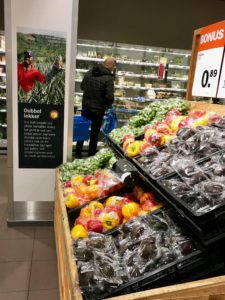
A Dutch retailer claims that buying containers of fresh fruit, produced by Blue Skies in Ghana, helps improve living conditions in the villages of the growers. Is that really true and is it sustainable? An investigative journalist from the Netherlands looked into it and shares his experiences.
Not so long ago, the fruit and vegetable department of numerous branches of the leading Dutch supermarket chain Albert Heijn displayed a poster with a photo of a pineapple farmer. It shows ‘Kwabena from Ghana’ whose produce is ‘double nice’: ‘Our fruit not only tastes nice, it also gives you a nice feeling. That’s because our growers, together with the AH Foundation, contribute to better living conditions for the local community.’ The message is clear: buy a plastic container of fresh fruit and do your bit to make the world a better place.
The AH Foundation – AH is short for Albert Heijn – is a relief fund that builds classrooms, boreholes and other public facilities in the African and South American countries that supply the retailer with fruit, vegetables and flowers. In 2019, the fund’s budget was €2.6 million, of which the supermarket chain paid €1.8 million and its suppliers the rest. Parent company Ahold Delhaize had a turnover of €66 billion.
Does the supermarket really contribute to the development of the regions that supply its fruit? And – not unimportant for the conscious consumer’s ‘nice feeling’ – what about the sustainability of this product? Albert Heijn claims to be the most sustainable supermarket in the country. I went on a quest to verify these claims and to search for Kwabena, the poster model. My visit to Ghana took place before the outbreak of the COVID-19 pandemic.
In this West African country, Albert Heijn buys its fruit from Blue Skies, a British multinational which also supplies numerous other European supermarkets, including the UK, France, Italy and Denmark. Blue Skies, founded in 1997 by Anthony Pile, is a commercial success story, with factories in six countries, a revenue of £108 million and a profit of £3.3 million (2018).
It enjoys a good reputation in the development sector. By having fruits peeled, cut and packaged locally, it creates employment and adds value to the economies: the price per kilo for fresh fruit chunks is considerably higher than for whole fruits. In Ghana, Blue Skies employs over 1,000 people – on permanent and temporary contracts – and hundreds of day labourers.
The factory and its Ghanaian headquarters are located in the town of Nsawam, 30 kilometres north of the capital, Accra. There, the government has created a Free Zone, which exempted Blue Skies from most taxes for the first ten years. The company still benefits from a significant discount on its corporate tax rate: it pays 15 instead of 25 per cent.
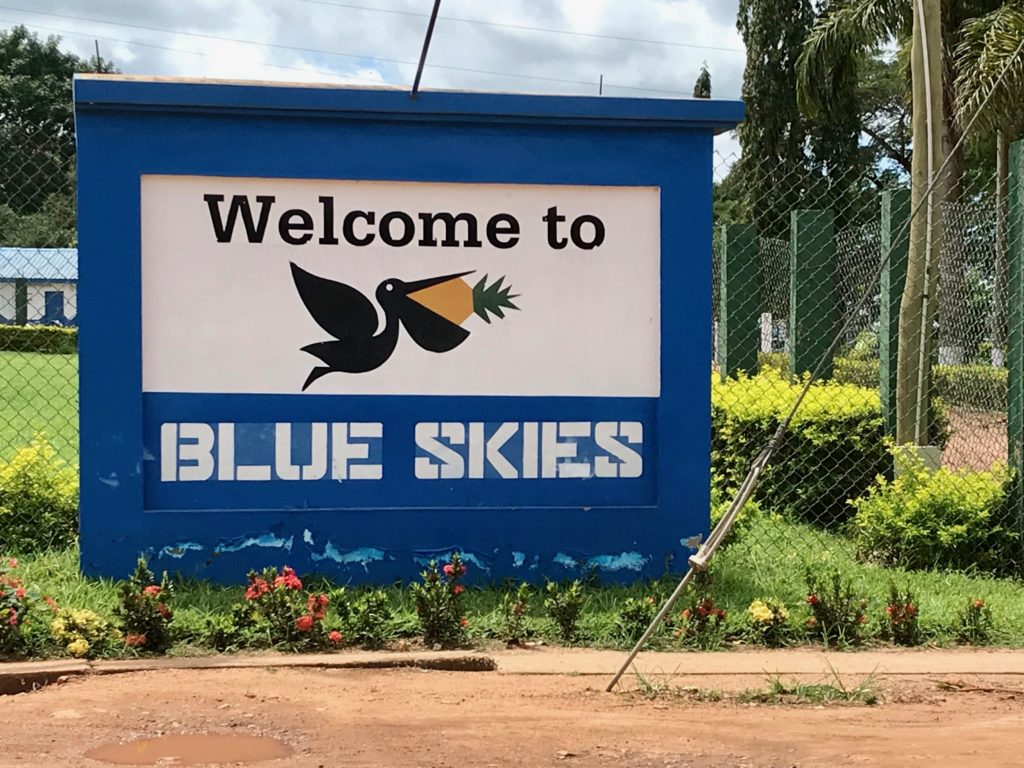 The majority of the capital (50.1 per cent) is owned by the Pile family – Anthony’s son Hugh has been the company’s CEO since the beginning of the year. The largest external shareholder (19.5 per cent) is self-proclaimed philanthropist Bob Geldof’s African investment fund 8 Miles. The Mauritius Leaks show that this fund has a target return of 20 per cent (for the duration of the fund) and a subsidiary in the tax haven of Mauritius. While 8 Miles states that responsible entrepreneurship and care for people and nature are essential considerations for investing in African companies, this tax structure deprives host countries of revenue. A journalist who interrogated the Irish singer on tax avoidance was asked in return how many irrigation channels she had financed with her salary.
The majority of the capital (50.1 per cent) is owned by the Pile family – Anthony’s son Hugh has been the company’s CEO since the beginning of the year. The largest external shareholder (19.5 per cent) is self-proclaimed philanthropist Bob Geldof’s African investment fund 8 Miles. The Mauritius Leaks show that this fund has a target return of 20 per cent (for the duration of the fund) and a subsidiary in the tax haven of Mauritius. While 8 Miles states that responsible entrepreneurship and care for people and nature are essential considerations for investing in African companies, this tax structure deprives host countries of revenue. A journalist who interrogated the Irish singer on tax avoidance was asked in return how many irrigation channels she had financed with her salary.
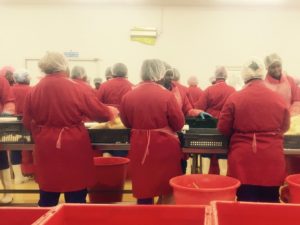
I start my quest in Accra, a rapidly expanding metropolis of more than four million people, a few degrees above the equator, where luck is on my side. During a taxi ride on the first day, the driver tells me he knows someone who worked for Blue Skies and who lives in a village of pineapple farmers. The ride there takes us through a hilly, fertile landscape. The farmers grow different crops, such as pineapple, pawpaw, bananas, yams, red pepper, corn and tomatoes, some for their own consumption, others for the market.
We arrive in Fotobi, where the former worker and her mother welcome us at their courtyard, between the clotheslines. Soon after, her neighbour turns up, pineapple farmer Daniel Djan. He immediately recognises the grower from the poster. ‘That’s Attakra,’ he says firmly. ‘He lives nearby.’
On the way there, I visit a number of projects that – according to the AH Foundation – should create better living conditions. Albert Heijn and Blue Skies have not been informed about my visit, to avoid preparations and steering. An interactive map guides me to the exact locations.
These development projects – over 100 have been carried out in four countries over the past 11 years – are a collaboration between the foundations of Albert Heijn, Blue Skies and the British supermarket chain Waitrose. Last year, €173,000 were spent on the projects in Ghana – each foundation’s share being €58,000, which equals the weekly turnover of a small Dutch supermarket.
In Fotobi, they have built three classrooms and a staff room for the school. The paint on the walls is peeling, blackboards are broken or missing, and at the time of our visit two of the three classrooms are not in use. On the wall, it says: ‘Heaven got no bribe?!!’ In nearby Obodan, the classrooms built by the foundations look better. ‘This is

the model school, usually with 40 to 50 children in a class,’ says Ibrahim Mohammed, one of the teachers sitting under a tree having lunch. ‘Blue Skies regularly comes here with delegations from Europe.’ A photo of this school can be found on the website of Bob Geldof’s investment fund.
In Amanfrom, Blue Skies claims there is a public toilet block, used by 2,000 local residents. In reality, the building has been demolished and the government has installed better sanitation facilities. A similar toilet block is still standing in Pokrom, the village where the pineapple farmer supposedly lives. There is an overwhelming stench and ten out of twelve toilets are closed.
In a response, Blue Skies says that the Ghana Education Service and the schools themselves are responsible for maintenance, and there’s an agreement that local communities should keep the toilets clean. According to the company, the roof of the toilet block in Amanfrom was damaged during severe weather. ‘The Government’s initiative to provide a new facility (…) would unlikely have happened had we not taken the original initiative.’
At market stalls along the main road in Pokrom, no one recognises Kwabena (or Attakra). ‘Go to the farm just outside the village. If he lives around here, they should know him.’
That farm is the giant Golden Riverside. Its manager John Akafia takes care of 600 acres of land, that extends to the
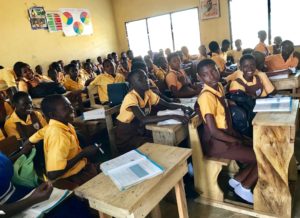
ridges on the other side of the valley. A tractor stands in the field in front of him, where seven field workers pick fresh pineapples for Blue Skies.
Akafia tells me they earn about GH¢500 per month, which is substantially more than the legal minimum wage fixed at GH¢11.82 per day. However, in developing countries the minimum wage is often far below subsistence level. The OECD encourages multinationals to pay a ‘living wage’, sufficient for basic needs. According to the organisation, Global Living Wage Coalition, which includes Fairtrade International, the wages in a peri-urban Ghanaian area such as Nsawam, should be considerably higher: GH¢1,244 for a single-person household and GH¢1,881 for a family. (The highest paid director at Blue Skies made £135,000 a year in 2018, approximately GH¢1 million, a salary comparable to that of the British Prime Minister).
Akafia is pleased with the partnership with Blue Skies, which started in 1999. ‘They have created a larger market for us. Production has increased thanks to fertilisers and the techniques we have learned.’
And Kwabena? No, unfortunately, Akafia doesn’t know him.
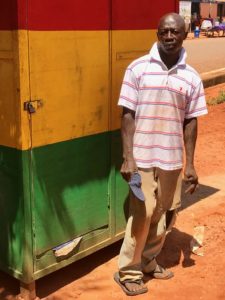
The search does not go unnoticed. That same afternoon I receive a call from Alistair Djimatey, the Ghanaian manager of the Blue Skies Foundation and the company’s PR manager. A few days later, he agrees to an interview and a factory tour.
In the meantime, I investigate how Blue Skies treats its own employees. Former CEO Anthony Pile liked to speak in soundbites, such as ‘We are talking about people, not workers. Everyone is important.’ A Dutch newspaper noted: ‘Whether you are with [Pile] on one of the fruit plantations or in the office; you always notice how grateful the people are who previously earned nothing but now enjoy a stable income.’ The current CEO, Hugh Pile, adds: ‘We go out of our way to provide the best possible working environment for our people,’ citing a partially subsidised meal in the canteen, a vegetable garden on the factory site, an Internet café, a library and sports facilities.
Outside the factory I also hear different stories. I interview twelve former Blue Skies employees and one current staff member, who can speak freely about their experiences. They are critical. ‘Enjoy a stable income?’ Although factory workers earn more than twice the minimum wage – the lowest income is GH¢770 per month – it is still insufficient to cover the basic necessities of life. Moreover, the vast majority of employees do not have a fixed income, but a temporary contract or work on an on-call basis. After six months they have to make way for others.
‘The relationship between management and staff is bad,’ a former manager says. He has spent 16 years with Blue Skies, leaving two years ago after he felt that his loyalty and commitment were underestimated. (Blue Skies says he underperformed and left on bad terms.) ‘There is a culture of fear with a lot of screaming and intimidation, but no one dares to stand up against it. That is not in our culture. At school you learn to obey, not to think independently. Employees are often told how easily replaceable they are. They are terrified to lose their jobs.’ Other former workers express similar observations.
There are also problems with the freedom of association, my sources tell me. Blue Skies deals exclusively with the Blue Skies Staff Association (BSSA), which was originally established as a welfare committee. Management refused to negotiate with a previously established independent union, the Food and Allied Workers’ Union (FAWU), even though it held the Collective Bargaining Agreement. A 2008 writ of summons shows that Blue Skies did not take the union seriously. ‘[FAWU] masquerades as a union,’ it says.
The three employees who were most strongly advocating for the independent union, were fired. According to management, this was the result of poor performance, but Richard Brakatu’s redundancy letter – he is one of the three – cites the 2009 recession as the cause: ‘As a result of the recession in the UK and the rest of Europe, we have witnessed a significant downturn in the demand for our products and sales and the collapse of profits […] In the circumstances, we are compelled to lay you off […] Once again, we reiterate that we deeply regret the situation in which we find ourselves. It remains for us to thank you for all you have done for the company and to wish you every good fortune in finding alternative employment in the future.’
In 2011, the International Trade Union Confederation (ITUC) mentioned Blue Skies in its Annual Survey of Violations of Trade Union Rights. Several sources, including a current employee, say they do still not consider BSSA as a real trade union, but as an extension of management. CEO Pile disagrees: to him, BSSA is an independent union and his company respects the freedom of association.
‘We have invested a lot of time and money to establish FAWU at Blue Skies,’ Abraham Koomson says. He is the secretary-general of the Ghana Federation of Labour, the second largest trade union umbrella organisation in the 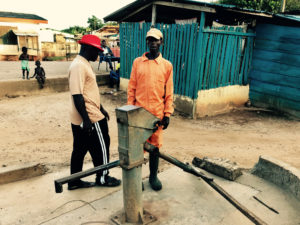 country, affiliated to ITUC. Koomson: ‘It was in vain. A real union is still missing there. We receive many complaints from the staff: about long working hours, health problems due to the cold in the factory, medical expenses that are not always reimbursed. They must pretend they are satisfied because they have a job at all.’
country, affiliated to ITUC. Koomson: ‘It was in vain. A real union is still missing there. We receive many complaints from the staff: about long working hours, health problems due to the cold in the factory, medical expenses that are not always reimbursed. They must pretend they are satisfied because they have a job at all.’
Pile says coughs and colds among the staff are a result of seasonal changes in Ghana, but three local doctors, two Ghanaian and one German, confirm that the working conditions in the cold room increase the risk of diseases and infections, such as chronic bronchitis, heart complaints, disorders of the musculoskeletal system and infections of the respiratory tract.
Blue Skies and Albert Heijn are unimpressed by the criticism. They refer to a SMETA audit that examines working conditions, safety and health provisions at the factory. On paper it should uncover the workers’ complaints, but according to Pile, last year’s report, based on interviews with 62 employees, showed 43 ‘good examples’ and zero non-conformances. The CEO also claims the factory meets Fairtrade standards and has successfully passed several other audits in the past. ‘It is difficult to conceive that all of these diverse agencies have been repeatedly wrong in their assessments of social conditions at Blue Skies,’ he writes. I am not granted access to any of these reports, due to ‘the market-sensitive information’ that’s in it. A proposal to sanitise these sensitive parts beforehand, has been ignored.
For Maria Hengeveld, who is doing a PhD at the University of Cambridge and has extensively researched ethical labels, it’s not at all inconceivable that they are all wrong. ‘Such audits function systematically the same: it’s a highly competitive sector, driven by profit and surrounded by secrecy.’
Hengeveld: ‘The SMETA audit is considered one of the weakest, because it doesn’t have any external checks. Even with methods reputed to be more reliable, it’s often easy for companies with major shortcomings to successfully pass an audit. With SMETA, the auditors can write down what they want and there is no incentive to actively look for malpractice. It’s common that management prepares employees for the audit and pressure them to provide desirable answers.’
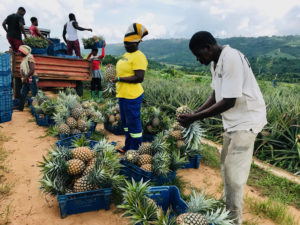 Internal sources confirm that such practices are also taking place at Blue Skies. A current employee says that it is usually not the auditor who selects the staff members for interviews, but management. Critical minds are systematically ignored. Moreover, the audits are announced in advance and staff aren’t provided access to the audit report once it’s completed. Two former employees confirm this course of events. Blue Skies maintains that the audits are unannounced and that the auditors make their own choices.
Internal sources confirm that such practices are also taking place at Blue Skies. A current employee says that it is usually not the auditor who selects the staff members for interviews, but management. Critical minds are systematically ignored. Moreover, the audits are announced in advance and staff aren’t provided access to the audit report once it’s completed. Two former employees confirm this course of events. Blue Skies maintains that the audits are unannounced and that the auditors make their own choices.
There’s news from Pokrom. Attakra has been tracked down, but the meeting ends in disappointment: he is indeed a pineapple farmer, but he is not Kwabena or even a supplier for Blue Skies. The quest takes a surprising turn that same day, when a local representative of the Blue Skies Foundation tells us Kwabena is not from this region at all. He lives more than three hours away in the Central Region. The proof: the pineapple he shows on the poster is not a smooth cayenne or MD2, the varieties cultivated around Nsawam, but a sugarloaf that grows over there.
Djimatey, the Blue Skies PR manager, agrees to help me find Kwabena. Since our quest is no longer under the radar, I decide I might as well ask for assistance. Prior to our meeting at the factory, I visit two more development projects in the area. The fire brigade has been provided with a new water supply system to fill the fire engine (which is leaking, so the impact is limited). And here, too, a school got a few new (overcrowded) classrooms. ‘We aim for a maximum of 40 per class, but it is usually 70,’ says assistant principal Godwin Yevu.
In an increasing number of Western and African capitals, confidence in such well-intentioned aid projects has sharply declined over the past two decades. The construction of schools, basic health facilities and wells, often with a short lifespan, has had little lasting impact in half a century. Ghana’s president, Nana Akufo-Addo, wants to wean his country off its dependence on aid as soon as possible, just like his colleague Paul Kagame in Rwanda. Only then, can real development take place, they believe.
Time for the factory tour. We see dozens of workers, mostly women, in red uniforms, who peel, cut and weigh fruit in the cold room. The bosses watch from behind windows, where the temperature is comfortable. The plastic containers already show the price in euros, including this week’s special offer: 300 grams of mango, papaya, pineapple and coconut for €2,75 (GH¢18,50) instead of €3 (GH¢20). Outside, a truck full of pineapples is being unloaded. Next to it are cargo containers from the Dutch airline KLM, designed to fit in the aircraft, under the passengers, which will fly to Amsterdam this night.
The fruit has to be continuously stored in cold rooms on the way, between 0 and 5 degrees, causing high CO2 emissions. Milieu Centraal, an independent Dutch consumer organisation that advises on the sustainability of products, ranks flown-in fresh fruit in plastic containers in the category most harmful to the environment. ‘Don’t buy,’ is the advice. Emissions for pineapples transported by ship to Europe are at least four times lower: ‘Good choice.’ For customers it’s often guesswork anyway, because the product makes no mention of its mode of transportation.
After the visit, Djimatey shares Kwabena’s contact details with me. The farmer does indeed live in the Central Region, in a village called Ekumfi Nanabin. I decide to go there immediately. After a ride on mostly unpaved roads, bouncing on the reggae beats of legend Alpha Blondy from neighbouring Ivory Coast, we reach his village towards the end of the afternoon. This time, there is no doubt. Here’s the pineapple farmer who provides European customers with ‘double nice’ fruit, approaching us with a smile on his face.
However, he has to make a correction. His name is not Kwabena, but Okwesi Johnston. His middle name is Kobena, a
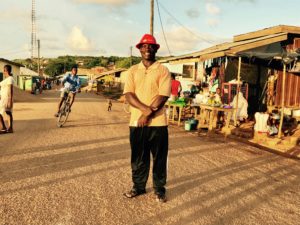
different way to spell Kwabena, but nobody calls him that. ‘I’ve let Blue Skies know my name is Okwesi a long time ago, but they have never changed it,’ he says. After a short visit to the village we hurry to his fields to take a new picture of him and his sugarloaves before sunset. Standing in his fields, he cuts open a pineapple with a machete and lets us taste the ripe, sweet fruit. That’s a nice feeling, undeniably.
However: ‘Business is not going so well. You have to eat more pineapple in Europe.’ His sales to Blue Skies have dropped sharply in recent years.
How does he think about his image being used in Dutch supermarkets? According to Albert Heijn, Okwesi is aware of this and ‘completely happy’ with it, and the Dutch retailer claims to have permission from Blue Skies to use the photo. The pineapple farmer himself has a different story: ‘That photo was taken about fifteen years ago. They never told me it could be used for marketing purposes and I didn’t get any money for it.’
This is where the story would end, were it not for the fact that the search for ‘Kwabena’ has been discussed earlier this year on Dutch public radio. After hearing that broadcast, lawyer Bert-Jan van Manen approached the pineapple farmer with the offer to demand a fee from Albert Heijn for him, pro bono. Okwesi agreed and the lawyer filed a claim on his behalf. The supermarket chain and the lawyer are currently discussing a solution.
Albert Heijn’s reaction
Albert Heijn distances itself from this article, which it sees as ‘unsubstantiated, incorrect and one-sided’ on important points. ‘We do not consider that the article was drawn up diligently. In no way do we recognise the image that is sketched of our supplier. We have been working together satisfactorily for twenty years, visit Blue Skies regularly and carry out independent audits. The company distinguishes itself by caring for its employees, respect for the environment and commitment to local communities. Although there are undeniable challenges to the implementation of projects by the Albert Heijn Foundation in Ghana, we know from our systematic and regular evaluations and on-site visits that the vast majority of the more than 100 projects have been successful, and satisfy a need among our supplier’s employees in Ghana and their local communities.’
Blue Skies responds
Hugh Pile (CEO): ‘We are a very open and honest organisation and have granted numerous studies into how we operate and our impact. Researchers have the freedom to enter our facilities and speak to our staff without intervention. We allow this because we are confident in the integrity of our business, but we accept fair criticism where it is due and we always listen to recommendations for how we can improve. Our people are the heart and soul of Blue Skies. We have a culture based on the principles of fairness and trust. We work openly together, freely share ideas and concerns, and respect one another regardless of gender, age, colour, creed or rank. This is the true Blue Skies. It is a business that our people have passionately worked to build over the past 23 years and which aims to bring positive benefits to the communities around us.’
Story & photos by Olivier van Beemen
The names of the anonymous sources are known to the editors. The travel and accommodation costs for this article have been reimbursed with a Free Press Unlimited grant. This story was originally published on the Dutch website Follow the Money.

Leaves a sour taste in my mouth!